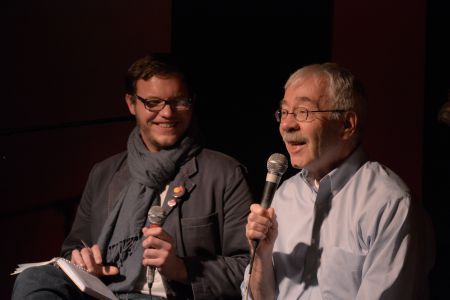Gerald Hannon still chokes up as he recalls the night of February 5, 1981 when Toronto police smashed up four gay bathhouses and arrested close to 300 men.
Hannon was working late at the office of the Body Politic, an influential gay magazine he wrote for in the 1970s and 1980s, when he got a call about the raids.
“It was scary when we got there. We went to every bath on our well known list of baths and there was a police car outside every one of them and a paddy wagon outside of several of them and men were being shoved out the door and shoved into the back.”
His voice trailed off and tears welled up in his eyes.
“They had brought in sledge-hammers and crowbars and smashed the place to shit.”
The 69-year-old writer, former sex-trade worker and winner of 13 national magazine awards spoke to around thirty people in Gottingen Street’s Company House last Sunday.
The day after the raids, Hannon continued, organizers from Toronto’s gay community met and decided they needed to fight back. A march was organized for that night.
“We turned up at midnight, terrified that no one would come… But within half an hour the place was packed, within forty minutes there were thousands. And we were suddenly marching down Yonge Street, taking it over.”
“We had done what we thought was the impossible,” he said, describing how
Toronto’s gay community came together to march on the Ontario legislature in Canada’s first major gay rights protest, a moment often likened to the pivotal Stonewall riots in New York in 1969.
Sunday’s event was organized by Solidarity Halifax and the Nova Scotia Rainbow Action Project, partly as a follow up to last month’s People’s History of Nova Scotia conference that focused on the untold stories of minority groups and activist communities.
Hannon’s talk ranged from his political awakening – a march on Fleet Street in London to protest how British tabloids were portraying gay people – to losing friends during the AIDS crisis of the 1980s and 1990s.
“It’s the type of history that we have to come together and talk about because it’s not the type of history that we see in history books that are in our schools systems,” said Tony Tracey, Atlantic representative for the Canadian Labour Congress, who attended the event.
Evan Coole, a member of Solidarity Halifax who helped moderate the discussion with Hannon, says, “with a community that has had to struggle to exist and had to struggle for its rights, it’s important to know how the mistakes of the past can be avoided, to know where we’re coming from to build on those past successes.”
Hannon says he’s noticed a change in young people’s interest in the history of the gay rights movement.
“There was a period, ten years ago, when someone my age was just ignored by young people. I don’t know if I was seen as a possible AIDS carrier or just a boring old fart.”
Today Hannon says he’s constantly asked to speak at events and give interviews.
Young people doing research “start seeing names, like mine and others … and they suddenly say, those guys and those women they’re still around … they’re swinging their dinosaur tails through the jungle and we can actually talk to them.”
“It’s kind of exhilarating going from being old fart to old wise man,” he laughs.
For Coole, getting to hear from elders in the gay activist community is both a privilege and a necessary part of the continuing struggle for equality.
“There’s a lot of the pieces of the puzzle which come from history. We have to find a way to put it all together if we’re going to keep moving forward on liberation.”
One aspect of liberation still lacking was on display when two people walked out of Hannon’s talk after he maintained that “gay liberation in Toronto was started by middle class young white guys.”
“It’s not as if we consciously excluded anyone,” Hannon said. “But I won’t be made to feel guilty about being white and organizing with other white guys, I’m sorry.”
Charlie Huntley, a member of Solidarity Halifax, stayed for the talk but voiced concern over Hannon’s exclusive focus the white community’s role in the gay rights movement.
“Sometimes the ways in which we tell our stories we have a way of erasing other people’s histories … this can be an alienating experience for the folks who weren’t a part of this narrative.”
“Given that Halifax oftentimes is a very segregated city, we need to get better about not alienating folks.” This means inviting people from the black queer community to present their stories alongside stories like Hannon’s, Huntley says.
Coole agrees. “It’s unfair to put that solely on the queer community, because Halifax is a very segregated place … and the queer community reflects that. But honestly I think we can be doing more. I don’t know what that looks like. But I think the queer community needs to get serious about dealing with racism.”



